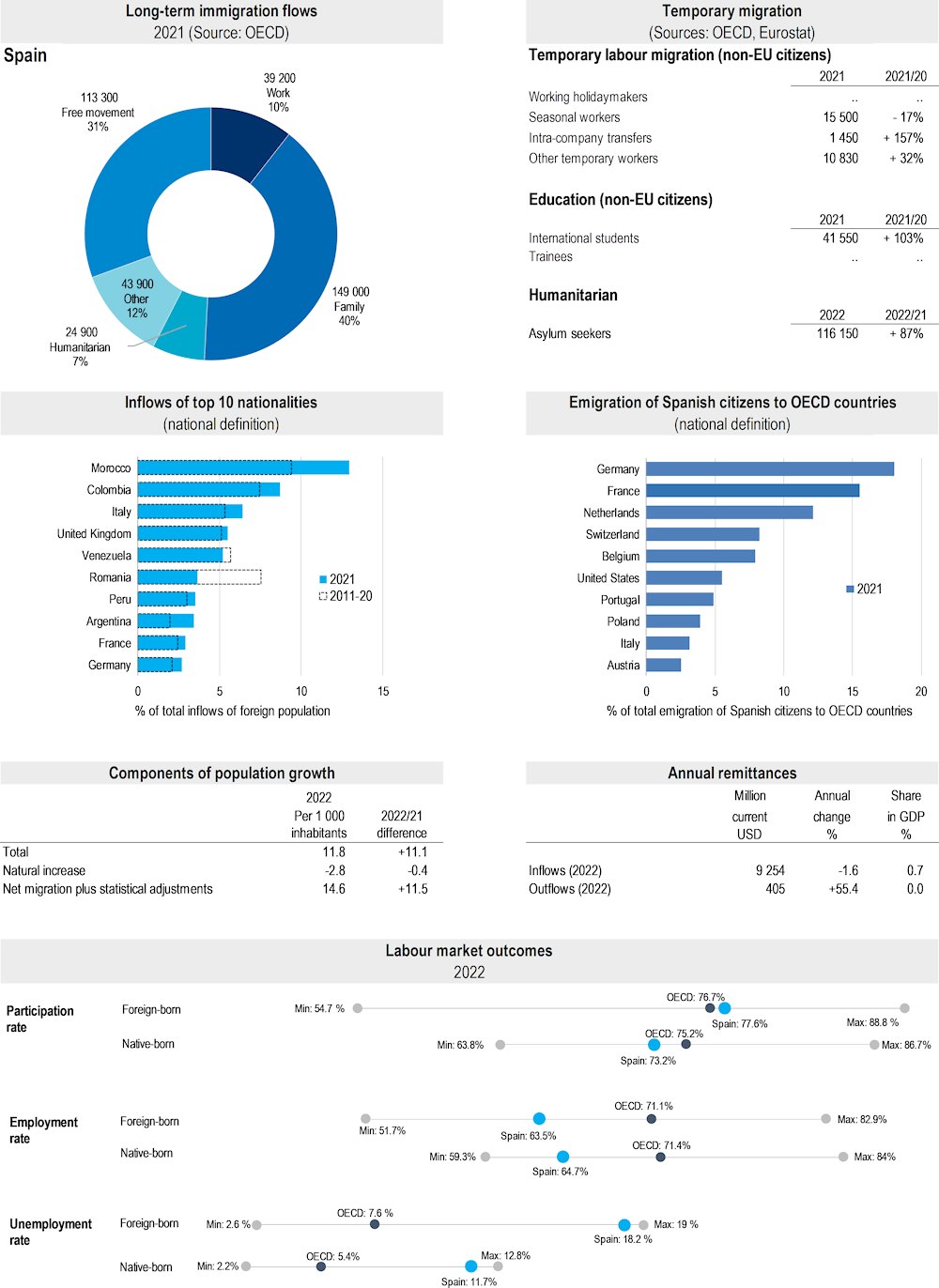In 2021, Spain received 370 000 new immigrants on a long-term or permanent basis (including changes of status and free mobility), 14% more than in 2020. This figure comprises 30.6% immigrants benefitting from free mobility, 10.6% labour migrants, 40.2% family members (including accompanying family) and 6.7% humanitarian migrants. Around 42 000 permits were issued to tertiary-level international students and 28 000 to temporary and seasonal labour migrants (excluding intra-EU migration). In addition, 88 000 intra-EU postings were recorded in 2021, a 7% increase compared to 2020. These posted workers are generally on short-term contracts.
Morocco, Colombia and Italy were the top three nationalities of newcomers in 2021. Among the top 15 countries of origin, Morocco registered the strongest increase (+14 100) and Colombia the largest decrease (‑11 600) in flows to Spain compared to the previous year.
In 2022, the number of first asylum applicants increased by 87%, to reach around 116 000. The majority of applicants came from Venezuela (45 000), Colombia (36 000) and Peru (8 900). The largest increase since 2021 concerned nationals of Venezuela (+30 000) and the largest decrease nationals of Mali (‑2 800). Of the 83 000 decisions taken in 2022, 42% were positive.
Emigration of Spanish citizens to OECD countries increased by 26% in 2021, to 73 000. Approximately 18% of this group migrated to Germany, 16% to France and 12% to the Netherlands.
In July 2022, the government reformed its General Immigration Law to address persistent labour shortages and promote regular migration. The new legislation expands work permits for foreign students, lowers income requirements for foreign nationals sponsoring minors, streamlines the process for certifying occupations affected by chronic labour shortages, and extends temporary work-related residence permits from two to four years with more flexible renewals. In addition, the reform provides new opportunities for irregular migrants to regularise their stay, including work and residence permits based on six months of formal employment or a 12‑months training permit based on two years of stay. The eligibility requirements and geographical scope for self-employment have also been relaxed. The establishment of a new immigration agency, the Unit for the Processing of Aliens Record (UTEX), aims to ensure consistent and efficient application of immigration regulations across all territories.
In October 2022, Spain adopted new regulations to streamline procedures for recognising foreign university degrees. Spanish authorities will launch an online platform for their recognition to replace in-person submissions, provide online status tracking for applicants and reduce processing times.
In December 2022, the Law for the Promotion of the Startup Ecosystem extended the maximum initial validity of permits granted under the Entrepreneurs Act from two to three years and eased permit requirements, for example by broadening the definition of “highly qualified professionals” and “entrepreneurial activity”. The law also created a digital nomad visa, which allows third-country nationals working remotely for companies outside Spain to stay for one year (renewable for up to 5 years), subject to certain conditions.
Spain has taken steps to promote circular migration, including the launch of a new edition of the Collective Management of Recruitment in Origin (GECCO) programme in September 2022. The updated programme aims to bring more than 16 000 seasonal workers from Morocco to work in Spain’s agricultural sector. Spain is also collaborating with Canada and the United States to promote legal migration from Latin America. It signed a circular migration agreement with Guatemala in January 2023 that, together with previous agreements with other Latin American countries, is expected to bring around 2000 seasonal workers to Spain in 2023.
Spain has taken measures to ensure comprehensive and safe reception of humanitarian migrants, including approving EUR 392 million in grants to 20 entities involved in refugee reception in July 2022. In addition, Spanish authorities implemented, together with UNHCR, an action protocol on gender-based violence in the reception system and signed an agreement with the President of the Spanish Olympic Committee to promote sports integration in the reception system.
As of December 2022, Spain lifted all COVID‑19‑related restrictions at its external borders.
For further information: www.inclusion.gob.es | www.boe.es | www.exteriores.gob.es

